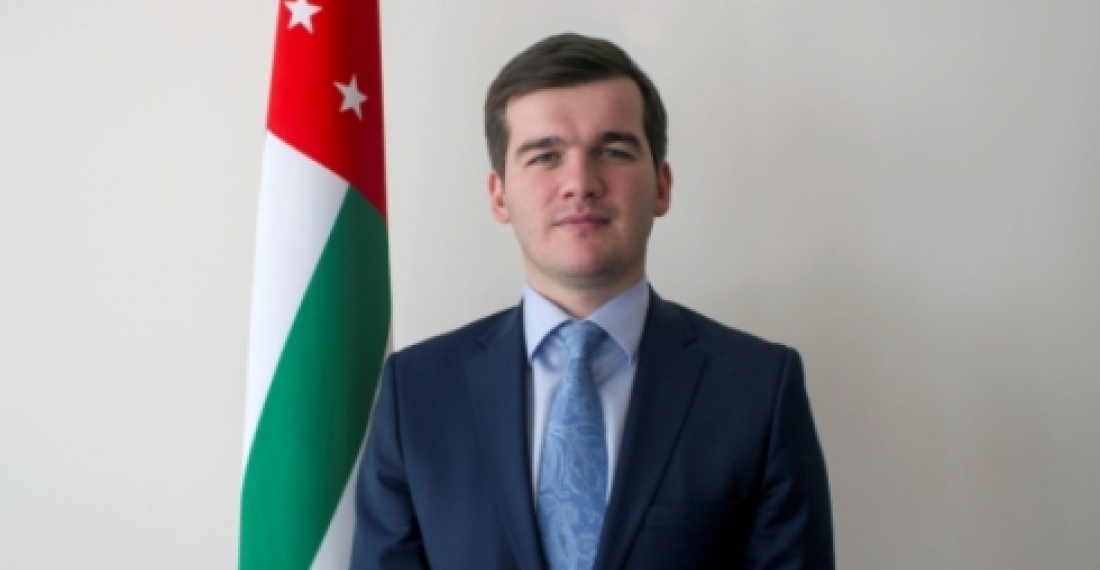Abkhaz Deputy Foreign Minister Kan Taniya tells commonspace.eu the new treaty with Russia has nothing to do with annexation.
by Joseph Alexander Smith
On November 24th this year, Abkhazia signed a "Treaty on Alliance and Strategic Partnership" with the Russian Federation, which further bolstered the already solid relationship between them. The treaty's announcement drew international criticism particularly from Georgia's European partners wary of a repetition of this year's crisis in Crimea, and brought thousands of demonstrators onto the streets of Tbilisi to protest against the "annexation" of Abkhazia by the Kremlin.
The treaty envisions the creation of joint command structures for security forces and law enforcement agencies, the extension of some social benefits to Abkhazia and a coordinated foreign policy shared by Moscow and Sukhumi.
In an exclusive interview in Sukhumi with Commonspace.eu, Abkhazia's Deputy Minister of Foreign Affairs, Kan Taniya, offers his government's view on the treaty and whether it really does amount to "annexation" of Russia by Abkhazia.
Commonspace.eu: What was Abkhazia's main reason for signing another treaty with Moscow?
Kan Taniya: The goal of this agreement is to ... to create better conditions for trade and economic development between our two states ... This signing was an important historical event for Abkhazia because as you know between ... our two peoples there is a huge history that unifies us and we have to continue this collaboration with Russia because for us there is no alternative.
We consider that Russia again confirmed and demonstrated to us its commitment to equal cooperation with Abkhazia and this is an example of respecting international law. Also we're interested in the expansion of international recognition of Abkhazia and this new treaty will strengthen the participation of Russia in [gaining] international recognition for Abkhazia.
Last but not least, the security and stability of Abkhazia depend on relations with Russia and this new treaty will further develop relations ... between our two Interior Ministries. So for Abkhazia and for the stability of the whole Caucasus region, this treaty is important.
Commonspace.eu: How will this treaty help with gaining international recognition for Abkhazia?
Kan Taniya: We will have something like more coordination between our two ministries of foreign affairs. We have always collaborated with Russia and now we'll strengthen this collaboration and we'll try to find ways - maybe not always official ways to gain recognition - I mean not only by ambassadors or sending the Minister of Foreign Affairs or his deputies to the country, but maybe it could be by second-level diplomacy ... but always with the help of Russia because they have huge resources in other countries and many embassies and this treaty will confirm their [willingness] to help us in this process,
Commonspace.eu: What does this treaty offer in terms of security guarantees?
Kan Taniya: In terms of security we will create a common coordination centre and common security area. This will help our citizens to stay calm [knowing] that the Georgian government will not decide to attack Abkhazia again ... As you know we are officially in a state of war with Georgia. Until the non-use of force agreement is signed by Georgia, we have to protect ourselves in different ways and this treaty is one of our options.
Commonspace.eu: How would you respond to the notion that this treat represents the "annexation" of Abkhazia by Russia?
Kan Taniya: If we really wanted to join Russia, it [would be] a question of a few days. We would just ask and it would be done. Russia is our main ally and partner so ... we laugh when we see this kind of demonstration in Georgia against the annexation of Abkhazia by Russia. If you go and read [the new treaty], you'll see there's nothing in it to do with annexation. It's a treaty between two sovereign states.
While the Abkhaz Ministry of Foreign Affairs is adamant that the new treaty enhances, rather than threatens, the sovereignty of Abkhazia, some hold more ambivalent views. Commonspace.eu also carried out street interviews on Sukhumi's seafront to canvass local opinion on the treaty.
"I think that Russia is a powerful state, and if they wanted to, they could [annex Abkhazia]" said Nala, a 22 year-old landscape architect. "I don't know. We are a small country, and if we don't assert our independence, no one else can do it for us."
Esma Lagvilava, a 32 year-old journalist was asked about whether the treaty threatens Abkhazia's independence. "The independence of what?" she retorted. "Today Abkhazia is in principle not able to provide for its own protection and a decent standard of living for its citizens. With regard to independence, well, we're not talking about becoming a part of Russia, we are talking about relationships ... mutually beneficial relationships."
"Independence for our citizens is the most important thing" said Jansugh, 31. "Actually the first version that we saw of this treaty wasn't as good as we wanted, but our parliament, our government ... did their best to change the main chapters and as a result, now it's much better for us."
"I believe that Abkhazia will not lose its sovereignty" said Temur Tsvizhba, a 23 year-old construction worker. "There is no such item [about annexation] in the treaty - at least it's not plainly written. Russia's influence in our territory was already clear before this treaty. This contract is just a formality."
source: Joseph Alexander Smith filed this report for commonspace.eu
photo: The Deputy Foreign Minister of Abkhazia, Kan Tania.







